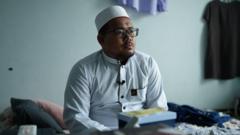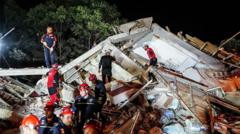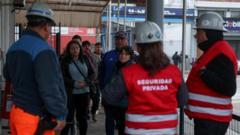The recent earthquake in Myanmar's Sagaing region has caused unimaginable tragedy, as communities mourn the loss of hundreds, with many victims being simple worshippers caught in their mosques during a sacred time of Ramadan.
Devastating Quake Claims Lives of 170 in Myanmar During Ramadan Prayers

Devastating Quake Claims Lives of 170 in Myanmar During Ramadan Prayers
A massive earthquake struck Myanmar, causing immense grief as over 170 worshippers lost their lives during Friday prayers on the cusp of Eid.
On the fateful Friday in Sagaing, as the call to prayer harmonized with the warm air, hundreds of Muslims crowded into the city's mosques for a solemn observance, unaware that just moments later, a catastrophic earthquake would strike. Occurring at 12:51 local time (06:21 GMT), the earthquake resulted in the collapse of three mosques, claiming the lives of nearly all inside. This catastrophe hit particularly hard for Soe Nay Oo—a former imam of the Myoma mosque now living in Thailand—who learned that about 170 of his loved ones and congregation members perished in the disaster.
The death toll continued to rise, with the overall casualties exceeding 2,700 as recovery efforts progressed steadily. Eyewitness reports indicated that many worshippers were unable to escape the crumbling buildings in time, while community residents expressed their anguish publicly and through social media. The devastation was overwhelming, especially on Myoma Street, reported as the area most severely affected. As survivors faced grim realities, food and shelter became critical issues for many left homeless.
Soe Nay Oo recounted the heartbreaking loss of beloved family members and dedicated community members. Among the deceased was a dearly cherished cousin of his wife, and a respected businessman who treated him like a brother. Reports revealed that some worshippers were found outside the prayer hall and near washing areas, indicating desperate attempts to flee the falling structures.
Even as Soe Nay Oo experienced profound grief, his thoughts lingered on the departed, who he referred to as martyrs. The deaths during Ramadan, a time of reflection and prayer, weighed heavily on the community. It is complicated further by military unrest and restrictions around burial practices in specific areas, causing additional pain for families unable to lay their loved ones to rest in accordance with their faith.
The survivors are grappling with the weight of loss while still seeking to provide aid to those in need. Soe Nay Oo, who has momentarily put his human rights work on hold, is currently involved in coordinating rescue efforts, sharing crucial intelligence with contacts in the affected areas. He estimates at least 1,000 Muslims from his community are still in dire need of assistance, and he finds solace in being able to help when called upon.
The depth of loss and survivor's remorse for Soe Nay Oo is palpable as he recalls the cherished memories of those who perished. He grapples with feelings of guilt for not being able to protect his community, and the continued uncertainty about the well-being of his family compounds his sorrow. As recovery efforts proceed, the resilience of the Sagaing Muslim community in the face of such overwhelming tragedy remains a testament to their spirit and unity.



















